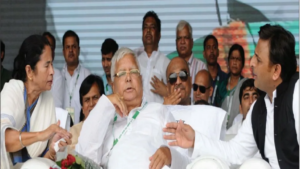While mishandling of the pandemic has made the government headed by Nitish Kumar and Sushil Modi unpopular, the ruling coalition is banking upon the pandemic to sail through. What’s the catch?

South Korea held its Presidential election in April. The New York Times reported, “They came wearing masks and stood in line at three-foot intervals. They were required to have their body temperatures taken, to rub their hands with sanitizer and to put on disposable plastic gloves handed out by officials. Then they entered the booths and voted, as South Korea pressed ahead with its first election in a time of epidemic.”
But in South Korea the number of eligible voters were 44 million. In Bihar the number is 70 million. And while South Koreans were allowed to cast their votes over a period of five days, in Bihar the chances are that it will be a one-day,10-12-hour affair in October. And Bihar is not South Korea.
Smart phone penetration in Bihar is less than 30% and Internet speed erratic. But the Bharatiya Janata Party demonstrated its digital edge earlier this year when it claimed to have put up 72,000 LCD screens across the state for a virtual rally addressed by Home Minister Amit Shah. It boasts of 72,000 WhatsApp groups in the state and claims to have deployed 9,500 IT Cell ‘heads’ in the state.
The opposition in Bihar were also opposed to the election on the ground that polling under the pandemic would give the ruling parties an unfair advantage. People under the Disaster Management Act can be arrested and detained by the police for not wearing masks or not maintaining physical distances, these parties had told the EC. But objections to holding the poll this year were overruled by the Election Commission.
New political outfits and smaller parties, finding themselves unable to cope with the requirements of a digital election, seem to have ruled themselves out. Election and communication strategist Prashant Kishor, who played a major role in the victory of JD(U)-RJDCongress combine in 2015 but has now fallen out with Nitish Kumar, was expected to convert the organisation he had floated into a political party. But he seems to have gone out of the race. The other impact is likely to be on voter turnout, which, leaders predict, could be as low as 25-30%.
The option of postal ballots is another tricky option being offered to voters above the age of 80 and voters with disabilities. Voters who will be in home-quarantine or in quarantine centres will also be allowed to cast postal ballots. Some reports suggest this facility is over and above the postal ballots allowed to servicemen. People will have to fill up a form and the postal ballot will apparently be carried to the residence of voters and the process video-recorded for transparency. This, however, is not mentioned in the Guidelines issued.
The state is creating additional 34,000 (approximately) polling stations, which will be 45 per cent more, and will increase the total number of polling stations to around 1,06,000, suggest other reports.
Barring the media and political parties, few people in Bihar seem interested in talking about the election, which is a surprise because people in the state breathe and live politics. It was difficult to elicit reactions but the few we spoke to sounded either indifferent or sceptical. But as was to be expected, some of the responses were startling.
Will RSS workers man the polling booths in Bihar? The bizarre question was asked in jest by a voter in the state. But he went on to argue that at the best of times, getting the right number of polling staff is a stretch. And at a time when the pandemic is raging and when floods tend to continue devastating several parts of the state till September, it will be even more difficult to get the polling staff. It will be easier to outsource the task, he banters. The election in Bihar this year, he predicted, will be either a farce or a fiasco.
There are others who agree with him. “In its handling of the pandemic, the state government’s ineptitude has been greatly exposed. To expect the same administration to handle the election efficiently is unrealistic,” he felt.
Biharis, never short on political humour, have been chuckling ever since the Election Commission of India came out with a set of guidelines for holding the poll (see box). Elections, they quipped, always generated significant employment in the state but this time, with restrictions in place, suppliers who provide masks, gloves, face shields and sanitisers will have a windfall.
Jokes are also circulating following Bharatiya Janata Party’s plea to the Election Commission that people in jail be barred from casting postal ballots and from digital campaigning. An ailing Lalu Prasad Yadav, the RJD founder who is in jail, people say, if allowed to campaign digitally, can get the measure of any BJP leader including the Prime Minister Narendra Modi.
“While the Prime Minister is unlikely to address 20-30 public rallies in the state, as he did in 2015, who will stop his online addresses? In past elections, he has perfected the technique of addressing voters from even outside the state, televised by all channels. There will be much more of such remote addresses by him this time,” says a CPI worker.
The guidelines do not specify the number of people who can attend physical rallies. The decision has been left to the Chief Electoral Officer of the state but with the rider that the number should not exceed what is prescribed for other public gatherings. It is not clear therefore how physical rallies will be held or how speeches will be amplified.
Courtesy: NHS Bureau







































